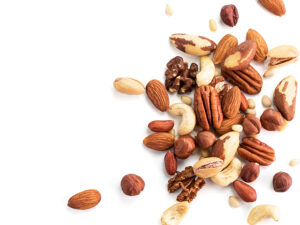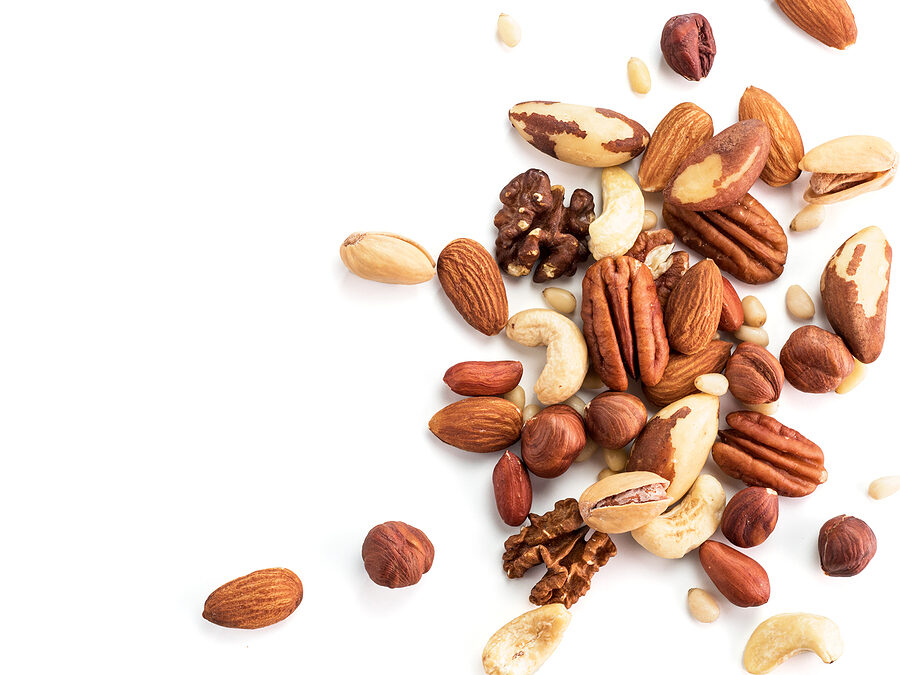 As long-standing staples in the bakery aisle, nuts and seeds have a lot to offer. Today’s consumers are aware of the benefits of regular nut and seed consumption, and they’re interested in taste-testing new formulations that feature a variety of these ingredients. That curiosity is creating opportunities for bakeries to expand their product offerings.
As long-standing staples in the bakery aisle, nuts and seeds have a lot to offer. Today’s consumers are aware of the benefits of regular nut and seed consumption, and they’re interested in taste-testing new formulations that feature a variety of these ingredients. That curiosity is creating opportunities for bakeries to expand their product offerings.
Here’s why nuts and seeds are an excellent way to boost the flavor, presentation, and health attributes of baked goods while helping bakers keep up with trends and demands.
Mix in better-for-you benefits
Many consumers are striving to eat healthier, and nuts and seeds support that goal. Though once considered to be high in fat and calories, they actually contain fewer calories than originally thought, include healthy fats, and are low in carbohydrates. Their high levels of protein and fiber help with satiety, so consumers can feel full while eating less.
Nuts and seeds also boast health-boosting nutrients like omega-3 fatty acids and several vitamins, minerals, and antioxidants. And research suggests that habitual consumption of nuts and seeds leads to health benefits such as decreased cholesterol and lowered risk of heart disease.
All these benefits are encouraging health-conscious consumers to add more nuts and seeds to their diets — whether mixed into granola, baked into bread, or garnishing a sweet baked good.
Interested in a cost-effective granola solution? Learn about the SENIUS granola baking line.
Meet current label demands
Nuts and seeds are a good fit for a variety of free-from, health-based, and diet-related food trends, including:
- Clean label: Because they are natural, recognizable, and minimally-processed ingredients, nuts and seeds support clean label creations.
- Plant-based: Nuts and seeds are a protein source that appeals to consumers looking to increase plant consumption or avoid meat proteins.
- Vegan: Nut- and seed-based milks and butters can replace dairy to create vegan-friendly formulations.
- Gluten-free: Bakers can use flours or flour mixes made from nuts and seeds to replace traditional wheat flours.
- Allergen-free: Depending on the recipe, nuts and seeds can replace common allergens like peanuts and other legumes. And consumers who are allergic to nuts gain similar health benefits from seeds.
Add taste, texture, and visual appeal
There are numerous nuts and seeds from which to choose, and each has a unique impact on taste. For example, the sweet, buttery taste of pecans works well in muffins, cakes, and cookies, while sesame seeds add a nutty flavor and texture to bread and buns.
Whole, halved, diced, or thinly sliced — bakers can mix nuts and seeds into recipes or use them in decorations. They add crunch to baked goods like cookies, pastries, bread, and granola. They also give bakery items a noticeable texture that suggests a healthy indulgence.
Follow the trends
Bakers can incorporate nuts and seeds into a variety of applications, both in their whole form and in flour, milk, or butter form. Here are a few that have gained popularity for their versatility and wellness benefits:
- Almonds: The subtle taste of almonds makes them a popular addition to a wide range of products. High in protein and fiber and a good source of several important nutrients, almonds strengthen the healthfulness of cereals and granola, baked goods, snacks, and more. Almond flour can easily replace wheat flour to make gluten-free baked goods.
- Hazelnuts: Ever since the introduction of Nutella, hazelnut consumption has gone up. Most consumers (88%) now consider hazelnuts a healthy food, and they’re curious about trying them in different applications, especially in baked goods.
- Walnuts: Walnuts are the only nut containing high amounts of plant-based omega-3 alpha-linolenic acid, an essential fatty acid the human body can’t produce. Bakers can add them into batters and doughs or use them as toppings. Walnuts work well with both sweet and savory seasonings, further expanding the flavor and formulation possibilities.
- Sunflower seeds: Sunflower seeds are high in protein (higher than nuts and legumes), yet low in carbs. Sunflower butter is an ideal alternative to peanut butter, and the seeds themselves make a great addition to snack bars.
- Hemp seeds: In seed, oil, or flour form, hemp packs essential nutrients into baked goods like bread, cookies, and cakes. It contains more protein and omegas but fewer carbs than alternatives like flax and chia seeds.
From a complete granola line to seeding conveyors for artisanal bread, we offer a variety of equipment to help you meet consumers’ needs by incorporating more nuts and seeds into your bakery products. Contact us to learn more

